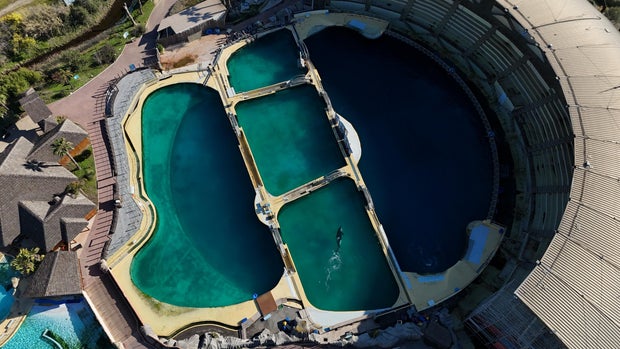A video posted online of two orcas circling in an algae-infested pool in southern France has brought a fresh wave of worldwide concern for cetaceans, Wikie, 24, and her 11-year-old calf Keijo.
France has been struggling to find a new home for mother and son after their owner, a marine park on the French Riviera, closed down over a law banning shows featuring marine mammals.
Founded in the city of Antibes in 1970, Marineland closed to the public in January following a drop in attendance and the 2021 law.
In February, the park’s management submitted a request to urgently transfer the two orcas, also known as killer whales, and 12 dolphins to two parks in Spain, but the move was blocked by Spanish authorities saying the facilities were adapted for them.
“The situation at Marineland Antibes is an emergency,” said Canada-based NGO TideBreakers in a social media post after publishing the video.
“Leaving them in a shut-down facility, confined to a crumbling, decrepit tank, is simply not an option,” it said.
Should the two orcas fall ill, they “will likely be euthanized or succumb to the deteriorating environment,” the group warned.
The video, shot by drone early this month, shows the two orcas and dolphins in tanks the edges of which are green with algae, amid installations previously used for other marine animals in brackish water.
Contacted by AFP, the park management said that the orca and dolphin pools remained well-maintained and that about 50 employees were still working for the animals’ well-being.
The algae visible in the images were a normal phenomenon, it said, explaining that algae pores present in the filtered seawater that fills the pools develop each spring as the water warms up.
They were not harmful to the animals and were regularly removed by brushing, management said.
This explanation was backed up by Mike Riddell, who managed the park for 26 years before being dismissed in an ownership change in 2006.
AFP pictures taken in May 2020 during a press visit showed similar fine algae covering the edges of the pool.
But the TideBreakers footage prompted strong reactions, which, according to the park’s management, even included death threats against staff.
Officials said they share the NGO’s concerns, but the park’s attempts to find an emergency solution with the staff of France’s environment minister, Agnes Pannier-Runacher, have come to nothing.
Contacted by AFP, ministry officials said authorities were “ensuring that the animals continue to be housed under good conditions, pending their future destination,” and that the park was seeking “alternative solutions” moving forward.
“The only option left”
Animal rights groups want the orcas to be rehomed in a whale sanctuary where they will have more space to swim and will not be forced to breed or perform in shows, the BBC previously reported.
Lori Marino, president of the Whale Sanctuary Project (WSP), said their site in Nova Scotia is “the only option left,” the BBC reported. Her group is bidding to rehome the orcas in the eastern Canadian province despite a previous offer being rejected by the French ministry for ecology earlier this year.
A petition is urging the French government to send Wikie and Keijo to the coastal refuge in Nova Scotia, and last October, three environmental icons – Dr. Jane Goodall, Dr. Sylvia Earle, and Jean-Michel Cousteau – signed a letter recommending that the orcas be relocated to the sea sanctuary.
Mohamad Salaheldin Abdelg Alsayed/Anadolu via Getty Images
Following the Spanish ban decision, Marineland had hoped to transfer the orcas to a park in Japan. But the move was blocked by the French government, which demanded a transfer to a European park with higher welfare standards.
However, a solution involving the only such facility, in Tenerife, Spain, was vetoed last month by the Spanish government, which said the facilities there “did not meet the requirements,” according to French officials.
NGOs, including One Voice and Sea Shepherd, have requested permission to send specialists to Marineland to check on the orcas.
Born in captivity, the two mammals are unable to survive alone.
The longer-term solution, the French ministry and NGOs agree, should see the establishment of a marine sanctuary where orcas and dolphins could be cared for in semi-wild conditions.
Such a solution would cost $2.2-3.3 million per year, according to Riddell.
It is estimated that Wikie and Keijo still have decades to live, under adequate conditions.

